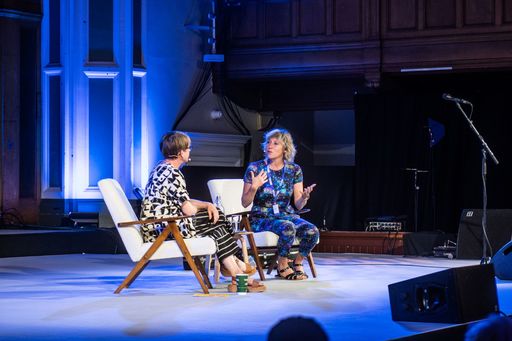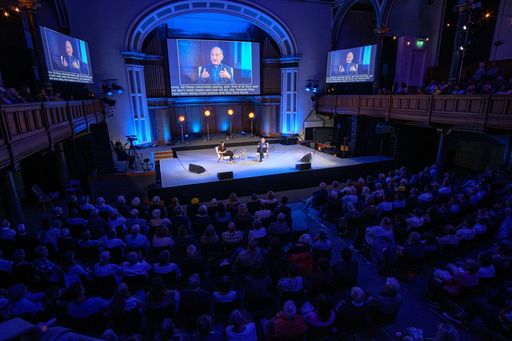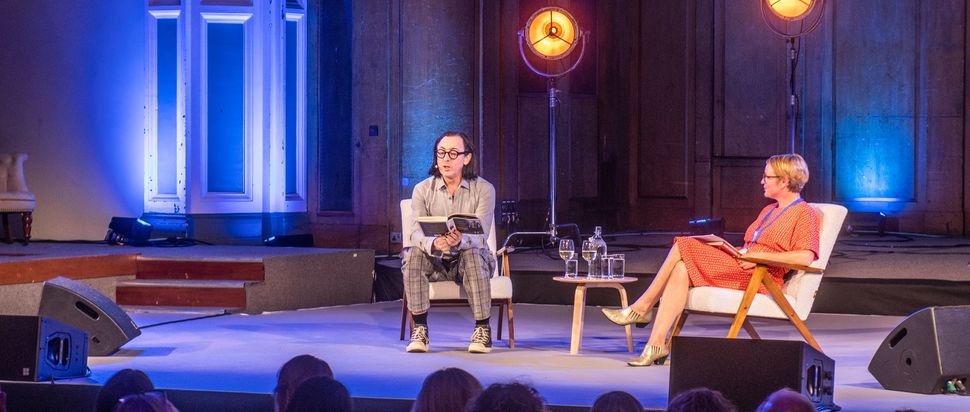Edinburgh International Book Festival: Week one recap
Now the first week of Edinburgh International Book Festival 2022 has been and gone, members of The Skinny team look back at some of the highlights
Alycia Pirmohamed and Jay Gao
It felt properly exciting to be back at Edinburgh International Book Festival, sitting alongside a bunch of strangers, some masked, all gathered to hear from two talented poets. Alycia Pirmohamed, winner of the 2020 Edwin Morgan Poetry Award, read from her debut poetry collection Another Way to Split Water; her book, which has been in the works for over five years, is a meditation on womanhood, belonging, faith, intimacy, and the natural world. Alycia revealed that she is drawn to poetry as a way to find answers (or sometimes not) to her many questions, and re-writes poems a lot as the process helps her understand what she wants to say. She said: “I think memory is such a big and abstract concept. It lives in everything.”
Jay Gao, shortlisted for this year’s Edwin Morgan Poetry Award, read from his debut poetry collection Imperium, in which he re-imagines episodes from Homer’s The Odyssey. He said: “There are a lot of ghosts in this book as I’m dealing with a very old text. The book is about how to impress upon the ghosts and find a language that can bring them into the now.” Jay, a self-confessed risk-taker, is currently conducting research into what makes a poem difficult. He said: “Most things do fail so you might as well go for it!” (Tina Koenig)
Martha Wainwright
On the Festival's opening night, Karine Polwart spoke to singer-songwriter Martha Wainwright about her memoir Stories I Might Regret Telling You.
“I was asked to write a memoir because it was a trend for successful musicians to do this. I took a small advance and did nothing for 18 months,” Martha said. When she finally started, she panicked about what she’d signed up to and realised she had to get on with it as she’d spent all of the money she was given upfront. Her memoir is confronting, dealing with difficult subjects like abortion, drugs and alcohol. She read from the opening scene of her book where her mother, who is pregnant with Martha, is about to have an abortion before changing her mind just before the procedure.

Martha Wainwright (R) talks to Karine Polwart. Photo: Simone Padovani
Growing up in Montreal with brother Rufus and her mother, she admits to never feeling as attractive or as talented as them. Rufus had “exploded [on to the music scene] right before I got started” and as her mum, dad and brother were all successful musicians, Martha doubted she could be good too. It was this insecurity which fuelled all of her songs: “Singing made everything better and over time, it became who I am and completely integrated into my person and my being.” Martha ended by singing her father’s song Pretty Good Day which she dedicated to Salman Rushdie. (TK)
You can watch Martha Wainwright in conversation with Karine Polwart online at edbookfest.org.uk
Patricia Lockwood & Harry Josephine Giles
It felt apt that Patricia Lockwood should join the Book Festival remotely, a projection looming above the stage behind poet Harry Josephine Giles, her words digitally-mediated. Lockwood’s 2021 debut, No One Is Talking About This, is often described as a “Twitter novel” for its exploration of one woman’s relationship with a synesthetic online realm, “the portal”, into which she plunges herself throughout the day. However, as Lockwood and Giles discuss with a referential chemistry only available to those steeped in the internet, the second half of the novel switches pace, becoming a powerful scrutinisation of pain, mirroring the experiences of Lockwood’s IRL family.
She speaks of “writing in the white-hot moment”, documenting her surroundings in the same fragmented way that people document their lives on the portal, desperately trying to capture the ephemeral. The book goes beyond a smartly funny portrayal of a life half-lived online, bearing witness to the protagonists grappling with grief, disability, and the dysphoric effects of working through trauma through the internet. Patricia spends less time in the portal nowadays; although she sometimes finds herself pulled to slip back into its sticky womb, she says it’s all about learning to respect your own momentum – she recommends crosswords. (Paula Lacey)
You can watch Patricia Lockwood in conversation with Harry Josephine Giles online at edbookfest.org.uk
Mariana Enriquez & Kirsty Logan
Separated from her audience by a case of COVID, Mariana Enriquez recounts to novelist Kirsty Logan how she ran away from home at 10 years old to watch Nightmare On Elm Street. It was her first memory of the communal experience of horror; of audiences screaming in unison, clutching each other in terror. Her fascination with cathartic fear echoes throughout her work, from the sinister short stories of The Dangers of Smoking in Bed to her hulking new novel Our Share of Night, which follows a father and son navigating a supernatural inheritance in Buenos Aires, spanning the cruel dictatorship years under which Enriquez grew up.
Exploring the psychogeography of a continent reeling from fascism, she faces directly into its darkness, saying that “sometimes, [a place] being full of history means being full of death”. She is not squeamish; her work is brutal and terrifying, approaching horror in a way that is not gratuitous, but does not shy away from the truth. Far from a woman “reclaiming horror”, Enriquez shrugs off the descriptor, explaining how an attraction to darkness is not subversive but a response to the violence of the everyday; “Besides,” she chuckles, “we all think vampires are hot”. (PL)
Armando Iannucci
Armando Iannucci, creator of The Thick of It and co-creator of Alan Partridge, appeared at Central Hall to talk about his latest work Pandemonium. The epic poem, which was written during lockdown, pairs politics, media and culture with the absurd. Iannucci was inspired to start writing his own poem after reading The Odyssey and Seamus Heaney’s translations of Beowulf.
“I thought, ‘Let’s raise politicians to the status of Gods and heroes and see what happens!’," Iannucci said. "It just poured out of me. I wanted to try and capture a social snapshot.”

Armando Iannucci at Central Hall for Edinburgh International Book Festival. Photo: Robin Mair
The poem blends comedy with what everyone was going through emotionally in each household. It’s also a blistering critique of the lack of leadership that was displayed on a daily basis. “These people have a say of whether people live or die – that’s why politics is important. I think [the Coronavirus pandemic] was the first time we really saw science in action. Despite us seeing the science, it was possible for an alternative set of facts and conspiracy theories to emerge,” Armando said passionately. He added: “What happened over the last year or so still sits with us. There is no limit to what we can do or say with satire.”
So, what’s next? Armando plans to write a poem about ‘Partygate’ and hopes to shoot a film next year set in the world of social media. He joked: “I can’t say anymore because Zuckerberg has my family.” (TK)
Watch Armando Iannucci's Edinburgh International Book Festival event online via edbookfest.org.uk
Alan Cumming
After this gig, Alan Cumming is going to a party to celebrate having a bagel named after him. “I love my bagel,” he laughs, unashamed. And this is the theme of the hour: unpretentiousness, anti-snobbery and authenticity.
We’re at Central Hall to talk about Cumming’s new book, Baggage, a main theme of which is finding your authenticity and holding on to it; sometimes for dear life. Baggage is a whirlwind through Cumming’s life and career; it’s not until event chair Jackie Wylie reels off his wide-ranging achievements that it becomes clear just how eclectic the path he’s taken has been.
Cumming is appreciative of everything he puts his name to. He appeared in films from the Spice Girls and Stanley Kubrick back-to-back, and is genuinely grateful to be in them both. Authenticity, he explains, comes from doing what he wants. Sometimes that’s playing a Smurf, sometimes it’s a challenging one-man Broadway production of Macbeth that led him to believe he would die.
Cumming is open, direct and incredibly thoughtful about his success and the opportunities open to him. “I have great access to darkness,” he says. “But I choose to stand in the light.” That’s not some glib, just-think-yourself-happy platitude at all, but a deliberate reaction to his circumstances from someone who’s clearly thought about this a lot. As a subject, Cumming is bursting with anecdotes, jokes and asides; as a human he is mindful, insightful and determined to live and act with kindness. Five stars. (Kirstyn Smith)
Watch Alan Cumming's Edinburgh International Book Festival event online via edbookfest.org.uk
